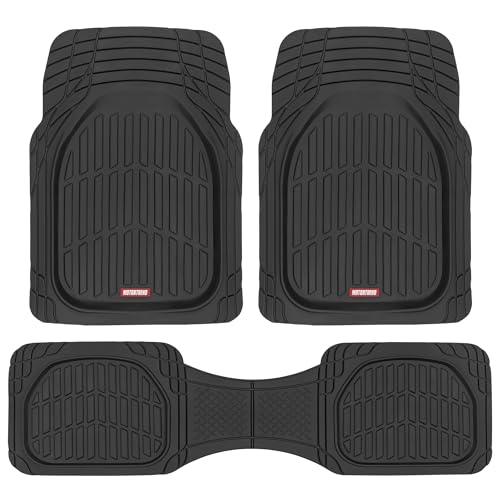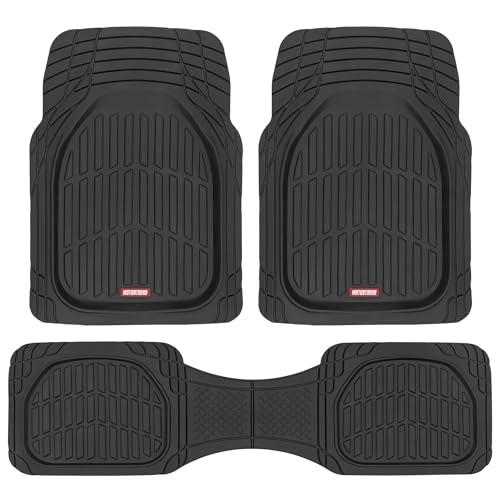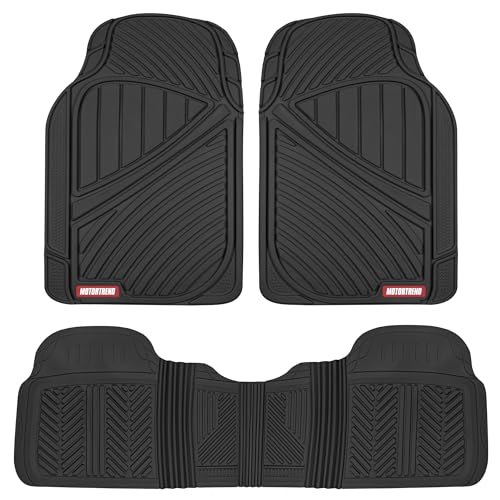The 2013 Ford Explorer has had multiple recalls. For a comprehensive list of the specific recalls and affected areas, owners can use the Ford Recall page or the FordPass® App.
The 2013 Ford Explorer is a popular SUV that has faced various recalls due to safety concerns across several components. According to Consumer Reports, there have been reported issues with the paint, trim, climate system, steering and suspension, body hardware, engine electrical, noises, leaks, engine major, and transmission major, among others.
In addition, Ford faced a class action lawsuit due to a carbon monoxide leak in some models. If you own a 2013 Ford Explorer, it is essential to check for recalls regularly using the Ford Recall page or the FordPass® App. This will ensure you can address any safety concerns promptly and keep your vehicle in top condition.

Credit: www.amazon.com
Common Problems Reported By Ford Explorer Owners
Ford Explorer owners with 2013 models have reported various issues that led to recalls. These problems include paint and trim issues such as fading or cracking, climate system malfunctions, steering and suspension problems, engine electrical issues, and transmission malfunctions. To find out if your vehicle has been recalled, check the Ford Recall page or FordPass app.
Common Problems Reported by Ford Explorer Owners
The 2013 Ford Explorer was a highly popular SUV model that sold well. Unfortunately, despite efforts to create a highly dependable vehicle, some 2013 Ford Explorer models were not without quality issues that resulted in multiple recalls. Many of these recalls were related to serious safety issues that could cause accidents and injuries. Below are the most common problems reported by Ford Explorer Owners in 2013.
Paint and Trim
Owners of the 2013 Ford Explorer reported fading, chalking, peeling, cracking, and rusting of the paint – a reason for concern considering it could lead to a lower resale value. Besides, there were also issues of loose interior and exterior trim or moldings. These can cause distractions while driving and even become safety hazards.
Climate System
The climate system in these vehicles had issues with temperature control, causing it to blow hot air even when set to the coldest setting. Other problems included a lack of airflow to one side, inconsistent defrosting, and water leaks.
Steering and Suspension
Noise and looseness in the steering system were common complaints, and some drivers also experienced issues with the front suspension component’s integrity and durability, which led to serious safety concerns.
Body Hardware
Defects in body hardware were another common problem. This includes issues with the tailgate, door latches, and power liftgate.
Engine Electrical
Issues relating to the engine’s electrical system include a failure of the fuel pump control module, which could cause the engine to stall, leading to a dangerous situation on the road.
Noises and Leaks
Common problems in the exhaust system led to unexplained noises and leaks. Drivers complained of a rattling noise under the car, which could also cause unpleasant odors to enter the passenger compartment.
Engine Major
In some instances, engine failures due to premature bearing wear, overheating, and coolant loss created significant problems for owners of the 2013 Ford Explorer.
Transmission Major
Transmission problems were another concern for owners, with some experiencing slipping gears, lagging, and lack of response when shifting gears.
Although the 2013 Ford Explorer was a popular SUV model, it was not without its quality problems. The above common problems highlight the importance of monitoring your vehicle for potential issues to keep it in top shape and safe on the road. If you own a 2013 Ford Explorer, be sure to check for any available recalls through the Ford Recall page or the FordPass® app to ensure you stay ahead of any potential safety risks.
What To Do If Your Vehicle Has Been Recalled
If your 2013 Ford Explorer has been recalled, you should immediately check the Ford Recall page or FordPass® App to see if your vehicle is affected. The recall is only issued when there are safety issues, so you should take it very seriously and follow the manufacturer’s instructions.
Checking For Recalls
If you own a 2013 Ford Explorer, it’s important to stay up to date with any recalls that may affect your vehicle. Thankfully, checking for recalls is simple. You can visit the Ford Recall page and enter your vehicle’s identification number (VIN). Alternatively, you can download the FordPass® App and check for recalls on your smartphone.
Importance Of Addressing Recall Issues
If you find that your vehicle has been recalled, it’s important to address the issue as soon as possible. A recall is only issued when there’s a safety issue, and ignoring a recall can put you and your passengers in danger. Even if the issue seems minor, it’s always best to have it addressed by a professional.
Here are some key reasons why addressing recall issues is essential:
- Recalls are issued to protect consumers from potential hazards
- Ignoring a recall can affect your vehicle’s safety
- Addressing recalls promptly can help keep your vehicle reliable long-term
- Recalled vehicles may be eligible for free repairs or replacement parts
Overall, staying on top of recall information is an essential part of maintaining your 2013 Ford Explorer. By checking for recalls regularly and having them addressed in a timely manner, you can help ensure your vehicle is safe, reliable, and enjoyable to drive.
Recent Ford Explorer Recalls
The 2013 Ford Explorer has been subject to several recent recalls. These recalls have ranged from malfunctioning instrument clusters to issues with the body and suspension of the vehicle. It is recommended to check for any current recalls on your Explorer through the Ford Recall page or FordPass® App.
Recent Ford Explorer Recalls:
The Ford Motor Company is one of the largest automobile manufacturers in the world, and the Ford Explorer is one of the most popular SUVs of all time. In recent years, however, the Explorer has had a few issues that have led to recalls. If you own a Ford Explorer, it’s important to stay up to date on current recalls to ensure the safety of you and your passengers.
Exterior Trim Risk
One of the most recent recalls for the Ford Explorer is related to the exterior trim. The recall affects the 2013 model year, and it was issued because of a risk of the trim coming loose and falling off while driving. This could create a hazard for other drivers on the road, as well as for the occupants of the Explorer itself. Ford has stated that they will replace any affected trim pieces free of charge for affected owners.
Rear Suspension
Another recent recall for the Ford Explorer is related to the rear suspension of certain models. This recall affects the 2013-2017 model years and was issued due to a problem with the toe link, which could fracture and separate from the rear suspension. This issue could cause a loss of vehicle control, which could result in an accident. Ford has stated that they will replace the toe links free of charge for affected owners.
Carbon Monoxide Leak
An older but still relevant recall for the Ford Explorer is related to a potential carbon monoxide leak in certain models. This recall affects the 2011-2017 model years, and it was issued because of a problem with the exhaust system that could allow carbon monoxide to enter the vehicle. This is a serious safety concern, as carbon monoxide is a poisonous gas that can cause illness or death if inhaled in high enough quantities. Ford has stated that they will repair the exhaust system free of charge for affected owners.
It’s important to stay up to date on any recalls that may affect your Ford Explorer to ensure the safety of you and your passengers. You can check for recalls on your vehicle through the Ford Recall page or FordPass® App. Make sure to act on any applicable recalls as soon as possible to prevent any potential safety hazards.

Credit: www.amazon.com
Impact On Vehicle Reliability And Cost
The 2013 Ford Explorer has been subject to several recalls, impacting vehicle reliability and cost. Reported troubles include rust, climate system, steering and suspension, body hardware, engine electrical, noises and leaks, engine major, and transmission major. To check for recalls on your vehicle, use the Ford Recall page or FordPass App.
Consumer Reports Rating:
Consumer Reports, the 2013 Ford Explorer has an overall reliability rating of two out of five, with a score of two out of five for predicted reliability. This indicates that owners of the 2013 Ford Explorer are likely to experience problems with their vehicle. This rating is based on various factors, including the number of problems reported by owners, the severity of those problems, and the cost of repairs.
Average Cost Of Repairs:
The average cost of repairs for the 2013 Ford Explorer varies depending on the nature and severity of the problem. However, according to Car Complaints, the most common problems reported by owners of the 2013 Ford Explorer are related to the paint, trim, and climate system, with an average repair cost ranging from $300 to $900. Other problems reported by owners include steering and suspension issues, engine electrical problems, noises and leaks, engine major issues, and transmission major issues. The cost to repair these problems can range from a few hundred dollars to several thousand dollars.
In conclusion, the 2013 Ford Explorer has a reputation for being unreliable due to the high number of problems reported by owners. The cost of repairs can also add up quickly, especially for more severe issues. It is important for owners of the 2013 Ford Explorer to regularly check for recalls and stay up-to-date on any potential safety issues.
Legal Action Against Ford
Ford is facing legal action over the 2013 Ford Explorer recalls with reported issues such as paint fading, interior and exterior trim or moldings coming loose, and rust. Consumers can check for recalls through the Ford Recall page or FordPass® App.
Class Action Lawsuit
In 2017, a class-action lawsuit was filed against Ford for the exhaust fumes that were supposedly leaking into the cabins of some of their vehicles. In the same year, it was reported that the National Highway Traffic Safety Administration (NHTSA) was looking into issues surrounding the exhaust leaks as well. This resulted in the recall of about 1.3 million Ford Explorers in the United States alone. This was to ensure that the problem was fully addressed and resolved, and that no further incidents occurred.
Center For Auto Safety
The Center for Auto Safety (CAS) is a non-profit organization established to advocate for the safety of drivers and passengers. They keep a watchful eye on auto industry practices and government regulation, and push for change to improve safety standards and regulations. The CAS is heavily involved in the Ford Explorer recall issue and has been pushing for more transparency from Ford on the matter. They have also been advocating for more stringent safety standards and regulations to prevent similar incidents from happening in the future.
In conclusion, the legal action taken against Ford regarding the Explorer recalls has been significant and warrants attention. The class-action lawsuit and involvement of organizations like CAS demonstrate the importance of holding companies accountable for the safety of their vehicles. It is also important for consumers to stay informed and vigilant about recalls and potential safety issues with their vehicles, and to take appropriate action to ensure their safety.

Credit: www.cnbc.com
Frequently Asked Questions For 2013 Ford Explorer Recalls
Are There Any Recalls On The 2013 Ford Explorer?
Yes, there have been recalls on the 2013 Ford Explorer. To check if your vehicle is affected, you can visit the Ford Recall page or FordPass® App and enter your VIN number. A recall is issued only when there is a safety issue.
What Are The Most Common Problems With 2013 Ford Explorer?
The 2013 Ford Explorer has some reported trouble spots such as paint fading, loose interior or exterior trim, rust, climate system, steering and suspension, body hardware, engine electrical, noises and leaks, engine major, and transmission major. There is also a recall for the SUV’s rear suspension.
To check for recalls, you can visit the Ford Recall page or FordPass® app.
What Is The Class Action Lawsuit On The 2013 Ford Explorer?
The 2013 Ford Explorer was involved in a class action lawsuit due to carbon monoxide leaks. There were reported engine and exterior problems such as paint fading, chalking, and peeling; loose interior or exterior trim or moldings, rust, and body hardware.
It’s essential to check the Ford recall page or FordPass®* App to see if there is a recall on your vehicle. Ford has recalled this car previously due to suspension and exterior trim defects.
How Do I Check My Ford Explorer Recalls?
To check Ford Explorer recalls, you can visit the Ford Recall page or FordPass® App. The page will provide you with the latest updates on any recalls on your vehicle, including safety issues related to paint, climate system, steering, body hardware, engine electrical, and transmission.
Conclusion
If you are an owner or planning to buy a 2013 Ford Explorer, be aware of the potential recalls associated with the vehicle. From paint and trim issues to engine and transmission problems, it is important to stay informed about these recalls.
You can check for recalls through the Ford Recall page or the FordPass® App. Remember, a recall is only issued when there’s a safety issue, so it is crucial to address any recalls for the safety of you and your vehicle.
Keep yourself and others safe on the road by staying up-to-date with the latest recalls.






